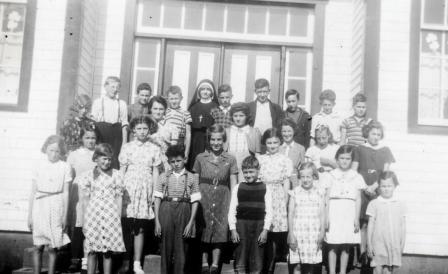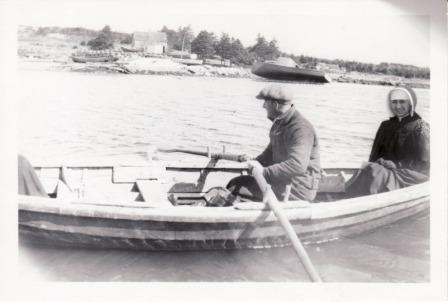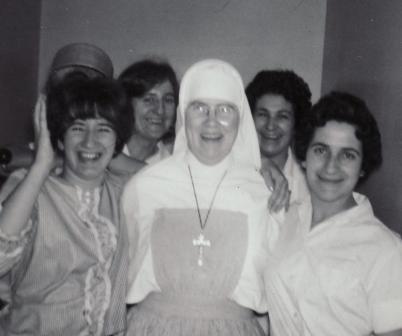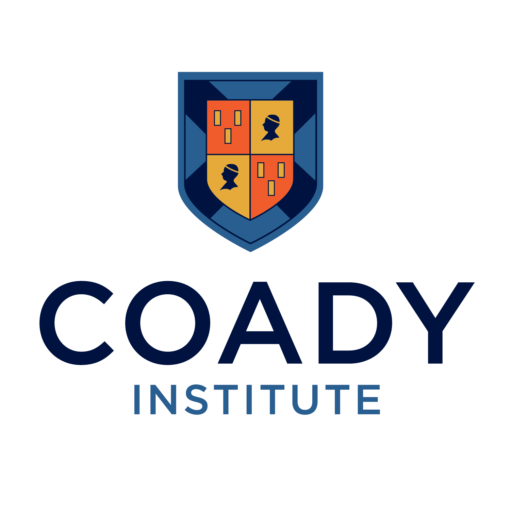The Congregation of the Sisters of St. Martha [The Marthas], founded in Antigonish in 1900, contributed in several key ways to the Antigonish Movement. The Marthas were created as a Roman Catholic domestic service congregation intended for a household management mission at St.F.X. University. The active, service-orientation of the Marthas, and their reputation for professionalism, hospitality and caring, quickly led to new missions and operations across the Maritimes and eventually Canada.
 Rev. Dr. Moses Coady became an enthusiastic admirer of the Marthas after his arrival in Antigonish. He supported their drive for autonomy from the university and once declared that, if he had fifty Marthas, he could change the world. The Marthas returned the support when they accepted his entreaties to enter the teaching field and open a public school at Margaree Forks, Cape Breton, in 1925. The much needed school was a success, prompting Coady to start the first study club to address adult education needs. By 1926, the local study club culminated in an artistic folk school based in the St. Martha’s school. This was the first example of Coady’s technique of community mobilization that would later become central to the Antigonish Movement.
Rev. Dr. Moses Coady became an enthusiastic admirer of the Marthas after his arrival in Antigonish. He supported their drive for autonomy from the university and once declared that, if he had fifty Marthas, he could change the world. The Marthas returned the support when they accepted his entreaties to enter the teaching field and open a public school at Margaree Forks, Cape Breton, in 1925. The much needed school was a success, prompting Coady to start the first study club to address adult education needs. By 1926, the local study club culminated in an artistic folk school based in the St. Martha’s school. This was the first example of Coady’s technique of community mobilization that would later become central to the Antigonish Movement.
The Marthas were aware of the mounting concern about the socio-economic situation in the Diocese. As part of the St.F.X. community, sisters attended the annual diocesan conferences where, in 1926, Coady, John R. MacDonald and others vigorously supported a plan for the congregation to establish a school of home economics at the motherhouse, equipped with a working farm tailored specifically for working rural women. While Bishop Morrison blocked the plan in favour of a home economics course at Mount St. Bernard, a women’s college affiliated with St.F.X., the Marthas did undertake fieldwork with rural women from the late 1920’s.
The congregation forged a direct connection with the new Extension Department when Sister Marie Michael MacKinnon joined its staff in 1931. A trained home economist, Sister Marie Michael was tasked with developing a women’s program. A few years late in 1935, another Martha, Sister Irene Doyle, was assigned to the Extension Department.
 The Marthas attracted the attention of Father Jimmy Tompkins who recognized the benefits their social work and education skills could bring to the depressed conditions of his parish in Canso. In 1933, they opened the Canso Welfare Bureau and Star of the Sea Convent at his request. The Marthas delivered pastoral, social, educational and health care services in the town of Canso with outreach to the fishing village of Little Dover and the nearby inland black community of Lincolnville.
The Marthas attracted the attention of Father Jimmy Tompkins who recognized the benefits their social work and education skills could bring to the depressed conditions of his parish in Canso. In 1933, they opened the Canso Welfare Bureau and Star of the Sea Convent at his request. The Marthas delivered pastoral, social, educational and health care services in the town of Canso with outreach to the fishing village of Little Dover and the nearby inland black community of Lincolnville.
The Coady International Institute and the Marthas enjoyed a warm relationship as well. Rev. Francis Smyth, the first director of the Institute, tried to create a family atmosphere through the Institute’s food services and library programs by securing the services of four Sisters of St. Martha. Sister Marie Michael MacKinnon of the Extension Department had retrained as a librarian and ran its library now located at the Institute. For years, she was a vital force at the Coady, not only for learning, but for compassion, friendliness and humour as well; her beneficent influence on the international students was highly valued. Today, the library where she worked from 1964 to 1972 is called the Marie Michael Library.
 Overall, the Marthas contributed significantly to the work of the Extension Department, Antigonish Movement, and Coady International Institute. In addition to assigning sisters to these projects, the Congregation has remained a loyal and generous financial and moral supporter.
Overall, the Marthas contributed significantly to the work of the Extension Department, Antigonish Movement, and Coady International Institute. In addition to assigning sisters to these projects, the Congregation has remained a loyal and generous financial and moral supporter.
